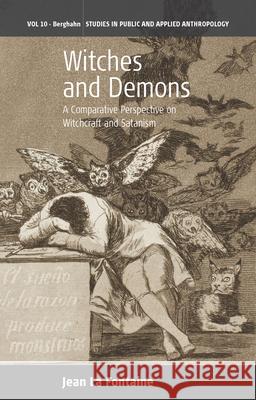Witches and Demons: A Comparative Perspective on Witchcraft and Satanism » książka
Witches and Demons: A Comparative Perspective on Witchcraft and Satanism
ISBN-13: 9781785331527 / Angielski / Miękka / 2016 / 156 str.
Witches and Demons: A Comparative Perspective on Witchcraft and Satanism
ISBN-13: 9781785331527 / Angielski / Miękka / 2016 / 156 str.
(netto: 111,71 VAT: 5%)
Najniższa cena z 30 dni: 115,87
ok. 22 dni roboczych.
Darmowa dostawa!
"This is an extremely interesting set of chapters. Together they create a carefully drawn exercise in comparison as a major methodological tool of anthropology, and its advantages and problems. The book is very clearly written, well argued, and fascinating." - Frances Pine, Department of Anthropology, Goldsmiths, University of London Devil worship, black magic, and witchcraft have long captivated anthropologists as well as the general public. In this volume, Jean La Fontaine explores the intersection of expert and lay understandings of evil and the cultural forms that evil assumes. The chapters touch on public scares about devil-worship, misconceptions about human sacrifice and the use of body parts in healing practices, and mistaken accusations of children practicing witchcraft. Together, these cases demonstrate that comparison is a powerful method of cultural understanding, but warns of the dangers and mistaken conclusions that untrained ideas about other ways of life can lead to. Jean La Fontaine is a Research Fellow of Inform and Professor Emeritus at the London School of Economics, where she taught for nearly twenty years. She received her PhD from the University of Cambridge and has chaired the Association of Social Anthropologists, and served as President of the Royal Anthropological Institute.
"This is an extremely interesting set of chapters. Together they create a carefully drawn exercise in comparison as a major methodological tool of anthropology, and its advantages and problems. The book is very clearly written, well argued, and fascinating." · Frances Pine, Department of Anthropology, Goldsmiths, University of London
Devil worship, black magic, and witchcraft have long captivated anthropologists as well as the general public. In this volume, Jean La Fontaine explores the intersection of expert and lay understandings of evil and the cultural forms that evil assumes. The chapters touch on public scares about devil-worship, misconceptions about human sacrifice and the use of body parts in healing practices, and mistaken accusations of children practicing witchcraft. Together, these cases demonstrate that comparison is a powerful method of cultural understanding, but warns of the dangers and mistaken conclusions that untrained ideas about other ways of life can lead to.
Jean La Fontaine is a Research Fellow of Inform and Professor Emeritus at the London School of Economics, where she taught for nearly twenty years. She received her PhD from the University of Cambridge and has chaired the Association of Social Anthropologists, and served as President of the Royal Anthropological Institute.











